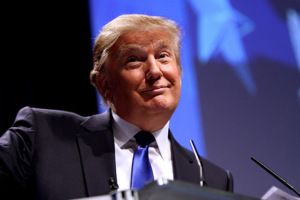Opinion
Opinion: What Trump says about us
Brit Moller
This article is more than 8 years old.

Donald Trump (photo: Gage Skidmore)
More than a year later, the vibrations from the 2016 US Presidential Election continue to reverberate in Washington and across the globe, making waves even here in cosy Denmark. Nearly everyone seems to have a theory about what happened, and many of them sound like something out of a mystery or crime thriller.
From well-documented stories of Russian interference on social media to allegations of collusion with the Trump campaign, a comprehensive account of what occurred remains an unfinished work. It’s notable that, even in the Danish press, nearly every week offers a new headline filled with speculation about what Trump’s campaign may have done, or how Facebook and Twitter helped spread fake news about Hillary Clinton and unwittingly aided his shocking victory.
A special investigation led by federal seasoned-prosecutor Robert Mueller aims to finally get to the bottom of things and hold accountable those who committed foul play. In the meantime, however, the world goes on and speculation swirls, from the US to Denmark and beyond.
One serious and underappreciated consequence of the so-called ‘Russia investigation’ is that much of the United States remains in the midst of a drawn-out acceptance process. Some basic hard truths about the meaning of the election have thus yet to be broadly accepted.
Why did Trump win? Because people voted for him
Let’s start with the first hard fact: Trump won and the American people, not Russia, elected him.
Incredibly, many political pundits and media outlets tend to explain away Trump’s surprise victory by likening it to a ‘perfect storm’ or freak occurrence – a narrative that basically assumes the result could never have occurred under normal circumstances. But this is just not the case.
Ultimately, this popular view fails to resolve a key riddle at the heart of the matter: how could the same country who twice elected President Obama decide to elect, as his successor, a man who publicly questioned his very constitutional legitimacy (i.e his American citizenship)?
Well, they did. To be precise, some 63 million Americans voted for Trump. Among them, at least 8 million or 9 percent of voters who supported Obama in 2012 decided to change parties and vote for Trump in 2016. That is a remarkable achievement. He won a sizable share of Obama voters.
While it may be somewhat comforting to absolve the American people of their electoral responsibility, any explanation that overlooks the public’s role in the matter is fundamentally incorrect. The American people elected Trump, not Russia. That much we know is certain.
That being said, it’s also true that a majority of Americans did not support him. President Trump indeed lost the popular vote by over 3 million votes. However, that’s not how presidents are elected. What matters is that he exceeded the only number that counts: 270 electoral votes. He got 304.
Speaking for many, many people
This leads to a second hard truth: Trump connected with tens of millions of Americans in an unexpectedly powerful way, and both his candidacy and rhetoric, as such, should be viewed as an expression of their feelings and beliefs, not simply his own.
It’s too easy to dismiss Trump as a moron or crazy person, since that misses the point underlying his undeniable success. He defied the odds precisely because he channeled very real views and anxieties that exist in many parts of the US – and, to be clear, that includes 8 million Obama voters and people who are not obvious racists, sexists, or otherwise deplorable.
Explaining his victory with clarity should therefore begin by acknowledging Trump’s very real ability to resonate and represent what many Americans feel and believe. As President Obama himself sombrely noted after the election, Trump “tuned into something”. Or, as then-candidate Trump infamously put it as only he could: “I could stand in the middle of Fifth Avenue and shoot somebody, okay, and I wouldn’t lose any voters, okay? It’s, like, incredible.”
Unfortunately, there’s a lot of truth in that.
President Trump was able to strike a chord with just enough voters, particularly in the midwest, to defeat a Clinton campaign with over twice the amount of financial resources, a far larger and much more experienced campaign staff, and with two presidents standing firmly behind her in the context of a relatively good economy with low unemployment. That’s something.
As an American who recently defected to Denmark, I can’t help but ask myself: “What does Trump say about us?” Clearly many Americans are fed-up with politics as usual and for good reason. Some 63 million voters were willing to support someone with many obvious failings of character, but who nevertheless gave a voice to their collective frustrations, darkest fears, prejudices and worst instincts – and yes, their legitimate concerns too.
Is it not time we finally asked ourselves, as citizens, how our inability to come to terms with Trump’s victory might reflect a deeper unwillingness to confront how we, in part, are responsible? Trump may only last four years, but the country who elected him will still remain.

About
Brit Moller
Brit is the former assistant director of government relations at UC Berkeley. He also previously worked as a policy advisor for the Consumer Financial Protection Bureau under the Obama Administration; as a legislative assistant on the US Senate Health, Education, Labor and Pensions Committee for the chairman, Tom Harkin; and as a speechwriter for Congresswoman Susan Davis. Brit currently lives in Copenhagen, Denmark.










































